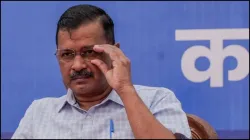Delhi liquor policy case: Arvind Kejriwal's judicial custody extended till August 20
Delhi liquor policy scam: CM Arvind Kejriwal was arrested by CBI on June 26 from Tihar Jail in connection with the Delhi liquor policy case.

Delhi liquor scam case: The Rouse Avenue Court on Thursday extended the judicial custody of Delhi Chief Minister Arvind Kejriwal until August 20 in connection with the Central Bureau of Investigation (CBI) case in connection with the alleged excise policy scam. Special Judge Kaveri Baweja extended Delhi CM's judicial custody after he was produced before the court via video conference.
The court is expected to consider a supplementary charge sheet filed by the CBI against Kejriwal in the case on August 12.
Kejriwal was arrested by the CBI on June 26 from Tihar Jail, where he is currently lodged in judicial custody in connection with a money laundering case filed by the ED. Kejriwal, who was originally arrested by the ED on March 21, was granted bail by the trial court in the money laundering case on June 20, but the high court stayed the order. On July 12, the Supreme Court granted him interim bail in the ED case, however, he continues to be lodged in Tihar jail here as he has not furnished the bail bond in the case.
No bail to Kejriwal by Delhi High Court
Earlier on August 5, the Delhi High Court had rejected the bail plea by Kejriwal in connection with the excise policy case. The court had reserved the order on the AAP leader’s bail plea on July 29 after hearing arguments of the counsel for Kejriwal and CBI. The High Court on July 17 had reserved its order on the plea challenging his arrest by the CBI in the corruption case linked to now-scrapped Excise Policy.
Delhi Excise policy case
The matter relates to alleged corruption and money laundering in the formulation and execution of the Delhi government's now-scrapped excise policy for 2021-22. It is alleged that the Delhi government's excise policy for 2021-22 to grant licences to liquor traders allowed cartelisation and favoured certain dealers who had allegedly paid bribes for it, a charge repeatedly refuted by the AAP. The policy was subsequently scrapped and Delhi Lt Governor VK Saxena recommended a Central Bureau of Investigation probe, following which the ED registered a case under the Prevention of Money Laundering Act (PMLA).
According to the CBI and the ED, irregularities were committed while modifying the excise policy and undue favours were extended to licence holders.
Also Read: Arvind Kejriwal suffers major setback, no bail by Delhi High Court in Excise Policy case